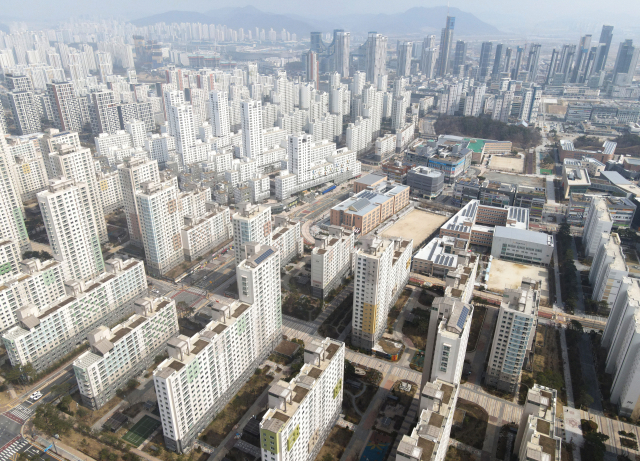■The national apartment disclosure price soared 19%… 70% subject to tax ↑
Sejong increased 69 times this year, 1,760 households… Busan and Gyeonggi-do tripled
The demand for’up to the 900 million standard’ is fierce, but the government “has no plans to repair”
 viewer
viewer
The number of apartments in excess of 900 million won, which is subject to comprehensive real estate tax on a per-home basis, is expected to increase by 70% compared to last year due to a sharp increase in prices, and households subject to the taxation tax are expected to increase significantly across Seoul and to major metropolitan areas. The government has been crying out for more than a year to ease the burden on end users of one house, but it is consistent with the criticism that the standard should be raised to 900 million won. Regardless of speculation, the backlash from single-households living in one house is increasing.
According to the announced price plan for apartment houses released by the Ministry of Land, Infrastructure and Transport on the 15th, the number of apartment houses nationwide that exceeded the official price of 900 million won subject to the taxation tax rose 69.5% (21,5,259) from 391,361 households last year to 52,4620 households this year. It has increased by 2.5 times in just two years from 218,124 households in 2019. In the case of Seoul, where expensive houses are concentrated, it increased by 47.0% (132,128 households) from 28,842 households last year to 412,970 households. It accounts for 16% of all apartments in Seoul, and one out of six houses pays full tax. Not only Gangnam in Seoul, but also in Gangbuk regions such as Masongseong (Mapo, Yongsan, Seongdong-gu) and Nodo River (Nowon, Dobong, Gangbuk), and in Mapo, a new taxpayer is expected to appear in the 20 pyeong area.
 viewer
viewer
In the metropolitan areas such as Gyeonggi and Incheon, and in Busan, Sejong, Daegu, and Daejeon, the number of tax targets increased significantly. Sejong City is the region with the largest increase in households subject to taxation this year in terms of the increase and decrease rate. This has increased by 69 times from 25 households last year to 1,760 this year. Busan and Gyeonggi Province more than tripled. Busan increased 329.6% (9,598 households) from 2,912 households last year to 12,510 households this year, and 309.5% (63,736 households) in Gyeonggi-do from 2587 households to 84,323 households. Incheon also increased by 265.42% (637 households) from 240 households to 877 households. In addition, Daegu has 9,106 households, 5,591 households (159.0%), and Daejeon has 2,087 households, an increase of 1,358 households (186.2%). In fact, it means that one homeowner in a major metropolitan city has been incorporated into the taxation range. Professor Kim Woo-cheol of the University of Seoul said, “It seems that there is a willingness not to stop the taxation drive while releasing the supply,” and said, “There is a high possibility that collective complaints will occur in major regions such as Seoul Gangbuk and Sejong City.”
The discussion on easing the one-house tax tax that was raised in the political world has quickly entered a backlash from the Ministry of Strategy and Finance. In October of last year, former leader of the Democratic Party, Lee Nak-yeon, announced a’new approach to real estate policy’ and came up with a plan for tax reduction for long-term residents, and collected it in one day. Since then, even if the house price has risen in the politics, voices have continued to say that it is an unrealized profit and that it should be viewed separately from the capacity to pay the tax, which has greatly increased due to cash flow, but the government is ‘Wooi Dok-kyung’. However, experts point out that it is problematic to use 900 million won as a standard for high-priced housing as apartment prices have risen sharply in recent years and the gap between the publicly announced price and the actual market price has decreased significantly. Professor Shim Gyo-eon of Konkuk University said, “The tax standard introduced in 2005 cannot be realistically met after 16 years.” “We need to reorganize the high-priced housing standard in consideration of house prices and inflation rates.
Regarding this, an official from the government made it clear on the day that “there is a continuous review of real estate-related tax reforms, but there are no specific plans or review matters for easing the tax burden, including 900 million won based on the tax imposition.” In the National Assembly Planning and Finance Committee held last month, some consensus was reached by the opposition parties to ease the tax burden on first-generation, one-homed residents, but the Ministry of Information and Communications opposes that “a careful review is necessary” and virtually collapsed. The ruling and opposition lawmakers proposed amendments such as the deduction rate for senior citizens in one household, long-term ownership deduction rate, and deduction limit for each residence period, or new deductions for each period of residence. ) They adhered to the position that they should see the effect of expanding the upper limit of the summation of deductions (70% → 80%). This is inconsistent with President Moon Jae-in, former CEO Lee, and Deputy Prime Minister Hong Nam-ki and Minister of Technology, who repeatedly stated, “We will reduce the tax burden on end users of one house.” Ahead of the elections, a message of sentiment is thrown, but the main perception of internal key figures is that there is great concern that the punitive tax will be mitigated even a little and that it will give other signals to the real estate market.
/Sejong = Reporter Hwang Jeong-won [email protected], Reporter Dong Ji-young [email protected]
< 저작권자 ⓒ 서울경제, 무단 전재 및 재배포 금지 >
